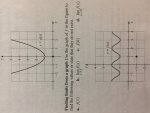Trying to understand a concept where the limits are as x approaches a constant, lets go with 2, is it possible to have a function where f(2) = 0 but have the limit not be 0. I've tried to create a variety of functions where in which case f(2) will = 0 but in turn this results in the limit also being 0.
Limits approaching a constant: can there exist f(x) so f(2)=0, but limit isn't 0?
- Thread starter bobman25
- Start date

